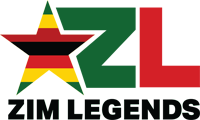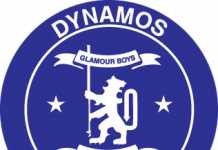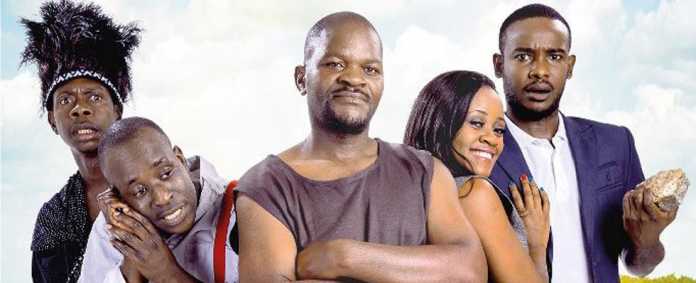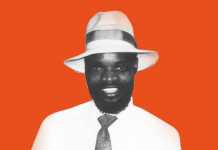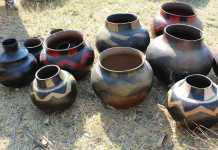Main Character
Lazarus Boora
Created By
Enock Chilhombori
Active
1976 – Present
Cast
Lazarus Boora – Gringo
Collen Dube – John Banda
Memory Makuri – Medhumbe
Enock Chilhombori – Toby Waters
Blessing Chimhowa – Mboudziyadhura
William Matenga – Gweshegweshe
ZBC Late 90s – Early 2000s
What started as a cartoon series in a local newspaper became a hit TV series. Enock Chihombori A.K.A Tobbie Waters or Mamvura (his character in the show), started writing Gringo cartoon on a weekly basis for Kwayedza. This cartoon series became very popular and others urged him to develop a cartoon book based on this character. After coming to an agreement that this book may not become popular with people who didn’t read Kwayedza, Enock decided to give Gringo more publicity by bringing the character to a TV screen.In early 1998, an actor by the name of Lazarus Boora was identified to play the leading role of Gringo. Gringo the comedy drama series was produced that year by The Zimbazbwe Broadcasting Corporation (ZBC), with Dorothy Chidzawo as the director. By mid that same year, Enock managed to have a Gringo cartoon book published. It was titled “Gringo auya”. Gringo the TV drama series became an instant hit with Zimbabwean viewers. The lead actor Lazarus Boora became a star. The majority of the actors in the series became popular as well. Actors like the late Collen Dube (who acted the role of John Banda), William Matenga (Gweshegweshe) and the late Stembeni Makawa (Mai Gweshegweshe) gained immense popularity. Enock himself played the role of Toby Waters, which exposed his previously untapped acting abilities. As soon as the series was over, there was an immediate demand for a sequel. So, in 1999 Enock wrote his second Gringo script titled “NdiGringo chete”.
Gringo was now established as a household name on Zimbabwean television. “NdiGringo Chete” was the first and last series in which Collen Dube featured as John Banda. The talented actor passed away in a swimming pool incident that shocked many Zimbabweans. His loss dealt a heavy blow to the Gringo series as he was one of its major stars. Enock was devastated. He recalls that, at that time he was having talks with the Gringo producer/director Dorothy Chidzawo to have a script written with John Banda as the main character. Collen Dube passed away without knowing what was being planned for him.
The year 2001 was probably the busiest year for Enock Chihombori. He wrote the third instalment of the Gringo series. This one was titled “Gringo Ndiani”. This time, ZBC’s Arnold Shoko took over from Dorothy Chidzawo as producer/director of the series. Shoko continued with the same standard of good work Chidzawo had set. This is the story in which another star was born. Blessing Chimhowa came in featuring as the ever humorous Mbudziyadhura. In 2002, the major event of the year for Zimbabwean artists was the inaugural National Arts Merit Awards (NAMA) which was staged in Harare. This is Zimbabwe’s premier event in which excelling artists and their works are honoured. In the Film and Television category, the drama series “Gringo Ndiani” came out dominant. It won the Best TV Drama Series award. The main actor Lazarus Boora won the best Actor award. Enock Chihombori won the Best Film and Television Script writer’s award. The end of that year saw Enock write two short stories on Gringo to celebrate the festive season. One was titled “Gringo – Christmas presents” and the other was titled “Gringo – Christmas Dinner”. The two stories were produced and directed by Arnold Shoko for ZBC. They helped cement the Gringo series’ position as one of Zimbabwe’s finest comedies and established Enock Chihombori as one of Zimbabwe’s best comedy writers.
In 2003, Enock then went on to work on yet another rib-cracking Gringo drama script for a long running series titled “Gringo Mari iripi?” Again, this production was directed by the veteran film-maker Arnold Shoko for ZBC. Gringo’s popularity soared. It saw Enock being nominated for the third consecutive time for a NAMA award in the category of Best Television and Film Script Writer. This time the award was won by another writer.
Enock struck a deal with ZBC and Shamiso Studios to write and help produce and direct a yearlong Gringo Drama series in 2005. The series was to be titled “Gringo Aripo”. Immediately he set about planning for the story and in no time that year he was already writing the script. Soon, with Shamiso Studios as the producers, shooting started on ‘Gringo Aripo”. Six episodes were shot and packaged before the deal between ZBC and Shamiso was unexpectedly cancelled. The drama that was supposed to run for a year was no more.
It was in 2006 when Enock wrote a film script for Gringo titled “Gringo Ndini”. He managed to get a sponsor for the film and arrangements were promptly underway to start shooting. Rehearsals were conducted without any hiccups. Problems started when the final budget was drawn. The sponsor withdrew by indefinitely postponing the shooting. Soon Enock applied for funds from The Zimbabwe Culture Fund to produce a DVD compilation of Gringo short stories. He was fortunate to be one of the recipients of the first disbursement of the funds. He wrote and managed to shoot two stories, “Gringo-The Ring” and “Gringo-The Restaurant”. The editing for these stories was not completed as the funds ran out due mainly to the inflation which was beginning to eat at the Zimbabwean economy. That same year, Zimbabwe’s leading singer, Oliver Mtukudzi sponsored and produced a short film titled “Chipo Changu”. Enock Chihombori created and wrote the script. Mtukudzi’s son, the late Sam Mtukudzi played the leading role.
In early 1998, an actor by the name of Lazarus Boora was identified to play the leading role of Gringo. Gringo the comedy drama series was produced that year by The Zimbazbwe Broadcasting Corporation (ZBC), with Dorothy Chidzawo as the director. By mid that same year, Enock managed to have a Gringo cartoon book published. It was titled “Gringo auya”. This is the same year that Enock’s professional career also took a big change when he moved from Cochrane Engineering to Airflo Fan Engineers. Gringo the TV drama series became an instant hit with Zimbabwean viewers. The lead actor Lazarus Boora became a star. The majority of the actors in the series became popular as well. Actors like the late Collen Dube (who acted the role of John Banda), William Matenga (Gweshegweshe) and the late Stembeni Makawa (Mai Gweshegweshe) gained immense popularity. Enock himself played the role of Toby Waters, which exposed his previously untapped acting abilities. As soon as the series was over, there was an immediate demand for a sequel. So, in 1999 Enock wrote his second Gringo script titled “NdiGringo chete”.
Gringo was now established as a household name on Zimbabwean television. “NdiGringo Chete” was the first and last series in which Collen Dube featured as John Banda. The talented actor passed away in a swimming pool incident that shocked many Zimbabweans. His loss dealt a heavy blow to the Gringo series as he was one of its major stars. Enock was devastated. He recalls that, at that time he was having talks with the Gringo producer/director Dorothy Chidzawo to have a script written with John Banda as the main character. Collen Dube passed away without knowing what was being planned for him.
Due to other work commitments, in 2000 Enock decided to stop producing Gringo cartoons for Kwayedza newspaper. It was a difficult decision for him to make as he felt he was letting down readers who had followed the cartoon strip for more than ten years. Nothing much happened on the filming scene for him that year other than putting together ideas for his next script. In December he got married to Noreen Kariwo, a girl he admired since the days he started working.
The year 2001 was probably the busiest year for Enock Chihombori. He wrote the third instalment of the Gringo series. This one was titled “Gringo Ndiani”. This time, ZBC’s Arnold Shoko took over from Dorothy Chidzawo as producer/director of the series. Shoko continued with the same standard of good work Chidzawo had set. This is the story in which another star was born. Blessing Chimhowa came in featuring as the ever humorous Mbudziyadhura. The same year Enock wrote an action story based on boxing. This was probably the first action drama series ever produced by ZBC. The story was simply called “Cobra”. It was also directed and produced by Arnold Shoko. The following year (2002), the major event of the year for Zimbabwean artists was the inaugural National Arts Merit Awards (NAMA) which was staged in Harare. This is Zimbabwe’s premier event in which excelling artists and their works are honoured. In the Film and Television category, the drama series “Gringo Ndiani” came out dominant. It won the Best TV Drama Series award. The main actor Lazarus Boora won the best Actor award. Enock Chihombori won the Best Film and Television Script writer’s award. The end of that year saw Enock write two short stories on Gringo to celebrate the festive season. One was titled “Gringo – Christmas presents” and the other was titled “Gringo – Christmas Dinner”. The two stories were produced and directed by Arnold Shoko for ZBC. They helped cement the Gringo series’ position as one of Zimbabwe’s finest comedies and established Enock Chihombori as one of Zimbabwe’s best comedy writers. This same year his first daughter, Kimberly was born in September.
In 2003 Enock won his second NAMA award for Best Television and film Script Writer. The award was in recognition for his work on “Cobra”. Enock then went on to work on yet another rib-cracking Gringo drama script for a long running series titled “Gringo Mari iripi?” Again, this production was directed by the veteran film-maker Arnold Shoko for ZBC. Gringo’s popularity soared. It saw Enock being nominated for the third consecutive time for a NAMA award in the category of Best Television and Film Script Writer. This time the award was won by another writer.
In 2005 Enock struck a deal with ZBC and Shamiso Studios to write and help produce and direct a yearlong Gringo Drama series. The series was to be titled “Gringo Aripo”. Immediately he set about planning for the story and in no time that year he was already writing the script. Soon, with Shamiso Studios as the producers, shooting started on ‘Gringo Aripo”. Six episodes were shot and packaged before the deal between ZBC and Shamiso was unexpectedly cancelled. The drama that was supposed to run for a year was no more.
Enock Chihombori wrote a film script for Gringo titled “Gringo Ndini” in 2006. He managed to get a sponsor for the film and arrangements were promptly underway to start shooting. Rehearsals were conducted without any hiccups. Problems started when the final budget was drawn. The sponsor withdrew by indefinitely postponing the shooting. Soon Enock applied for funds from The Zimbabwe Culture Fund to produce a DVD compilation of Gringo short stories. He was fortunate to be one of the recipients of the first disbursement of the funds. He wrote and managed to shoot two stories, “Gringo-The Ring” and “Gringo-The Restaurant”. The editing for these stories was not completed as the funds ran out due mainly to the inflation which was beginning to eat at the Zimbabwean economy. That same year, Zimbabwe’s leading singer, Oliver Mtukudzi sponsored and produced a short film titled “Chipo Changu”. Enock Chihombori created and wrote the script. Mtukudzi’s son, the late Sam Mtukudzi played the leading role.
Towards the end of 2011 it was decided by Enock that he would work on an independent Gringo film project. By December an ensemble of actors was rehearsing the script “Gringo Ndini”. The film’s title was changed from “Gringo Ndini” to “Gringo-Troublemaker”. Shooting commenced in January 2012.
Zimbabwe has produced some great shows with outstanding characters, Gringo is by far one of the best and most funniest. It’s a famous and old time favorite 90s sitcom starring Lazarus Boora playing the character ‘Gringo’. This show has a humor and a certain style that relates to all classes in Zimbabwe; with the main character who struggles to make ends meet financially working for a ‘well-off’ family in the city.
It’s a show that has brought many Zimbabwean families together undoubtedly. Many Zimbabweans overseas and back home have watched or heard about Gringo at some point in their life, the lucky ones have watched. You can be guaranteed that many people knew exactly what time the show started so they could gather around just to watch Gringo, including a couple of people sneaking a peak from the windows. Many people made sure that all the house work and chores were completed by the time Gringo started. The creators and directors definitely did a great job with Gringo, it didn’t have a certain target audience; it made everyone laugh, from different age groups to different races, and to different social classes.
Gringo is a treasure to many families, a key to memory lane, and just talking about it brings people together. One could compare Gringo’s level in Zimbabwe to the TV show ‘FRIENDS’ in America.

